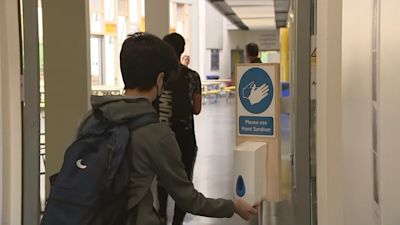Secondary school pupils transmit coronavirus as easily as adults, reports suggest

Scientists at Public Health England (PHE) have warned secondary school pupils can transmit coronavirus as easily as adults, reports suggest.
The findings are at odds with reassurances from Education Secretary Gavin Williamson who has said the report - due to be published later this year - showed there was "little evidence" of Covid-19 transmission in schools.
Though PHE researchers found there was little risk from primary school-age children, The Times has reported that researchers who worked on the study were unhappy with the way their findings had been used by ministers.
The newspaper says scientists at PHE believe tougher rules will likely be needed for older children at secondary school level.
It quoted a source close to the study who suggested that as children aged "their bodies start to act like small adults" - so passing on coronavirus more effectively.
The source told The Times: "Secondary children are most likely to get infected, have silent infection, transmit infection and get sicker.
"There’s a genuine concern that secondary school children are not the same as primary school children.
"Once community control of Covid-19 is lost then outbreaks are seen in secondary schools."
The paper quoted another source as saying it was likely a sixth-form college would spread Covid-19 at a rate similar to that of a gathering of older adults.
But on Monday, Mr Williamson said the upcoming study would support the government's position on reopening schools in England in September.
"We have always been and will continue to be guided by the best scientific and medical advice," he said.
"The latest research which is expected to be published later this year - one of the largest studies on the coronavirus in schools in the world - makes it clear there is little evidence that the virus is transmitted at school".
Dr Sarah Jarvis told ITV News the report suggested "older children, particularly teenagers, may be more likely to pass the virus on" but added that "the risks to children of catching coronavirus are extremely small".
She added the risks needed to be "weighed up" against the knock-on impacts of staying off school including, for example, vulnerable children.
Dr Sarah Jarvis on the 'real concern' about aspects of a return to school:
The GP added that "there is a real concern" around potentially increasing the rate of Covid-19 infections by having older children return to school.
"They may be better at social distancing while they're at school. But they will travel together on the bus, they're much more likely to get together and social distancing - in my experience - is not something that teenagers are very good at when they're together".
"So there is a real concern that we could push the R-number up by having teenager, particularly, travelling to and from schools".
When questioned on Tuesday about his government's advice reportedly being at odds with the initial findings of the study, the prime minster avoided a direct answer and stressed the need to avoid a second wave of coronavirus.
"Obviously we need to make sure that we don't have a second wave, that we do everything we can to avoid a second wave," Boris Johnson said.
"I'm afraid you are going to see outbreaks, we have seen them across the country in the last few weeks and months and we have also seen the immense efforts that local authorities have gone to, local communities have gone to, to get that outbreak under control.
"The most important thing for people to remember is that you have got to get schools back, we will get schools back, but also we have got to stick to our discipline - so in schools they have some very well thought through plans for how to manage it."
Modelling studies have previously suggested reopening schools across the UK in September must be combined with a high-coverage test-trace-isolate strategy to avoid a second wave of coronavirus later.
The majority of schools in Scotland will open within the next week.
The full findings of the PHE study are yet to be fully analysed.